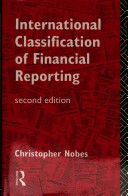International Accounting S.
2 total works
Financial reporting practices differ widely between countries and this has far-reaching implications for multinational business. With the growing integration of the international economy, the need for established systems of classification in financial reporting becomes all the more important. "International Classification of Financial Reporting" examines the causes and nature of the different practices. Chris Nobes asks whether classification is possible and useful. He offers a critical analysis of the attempts of other researchers to discern an order in the variety of accounting practices. This edition brings the analysis up-to-date, covering not only the changes of the last decade but also looking ahead at the developments for the future. The new classification system put forward in the first edition is reappraised in the light of these changes and the author proposes improvements to the scheme. This book should be of interest to academics, postgraduates and undergraduates in the field of international accounting, and to international accounting professionals.
An International View of True and Fair Accounting
by R. H. Parker and Chris W. Nobes
Published 6 October 1994
Since its genesis after the 1947 Companies Act, the concept of a "true and fair view" has produced much debate among professionals. The authors bring together the explanatory and often contentious opinions of key international accountants and lawyers. By including documents that have shaped international usage of that convention, Parker and Nobes provide a useful analysis of the full meaning and effect of a "true and fair view". Considered a "will-o-the-wisp" subject by most academic writers, the concept remains pivotal in much current accounting practice. Nobes and Parker attempt to clarify what international opinion has concluded about this central accounting issue.

